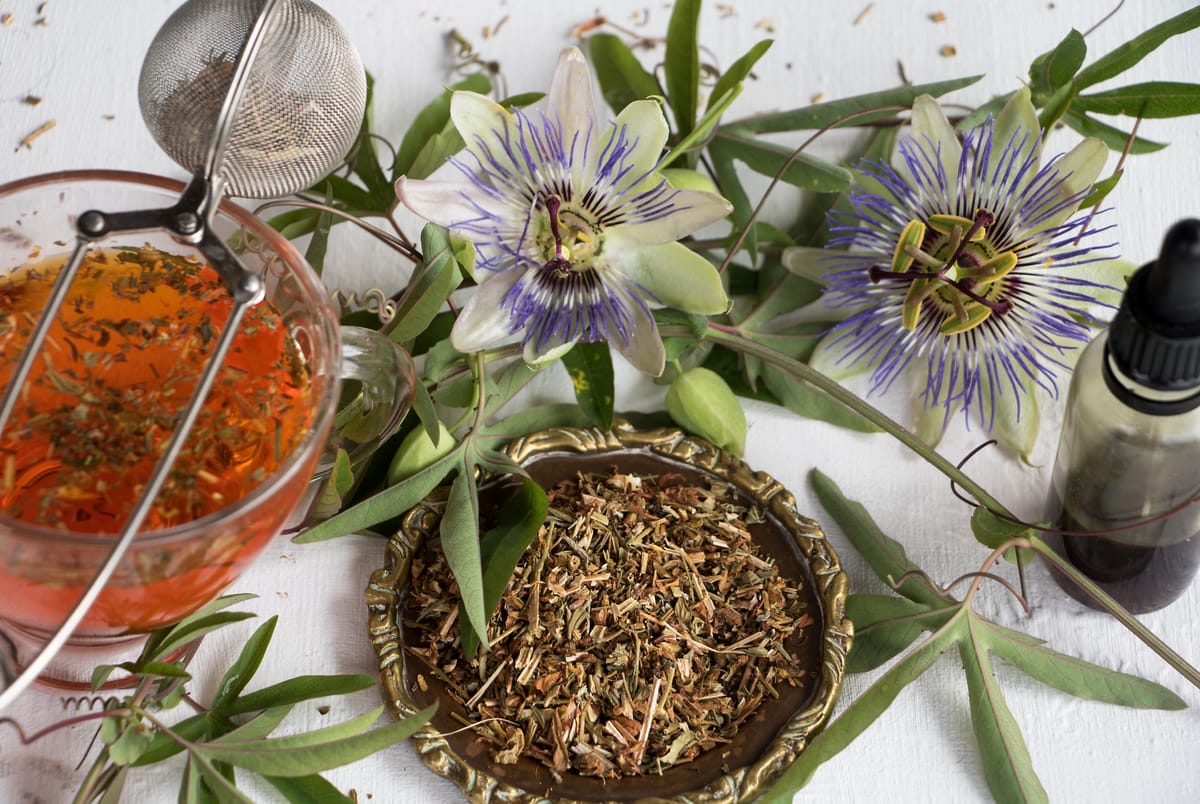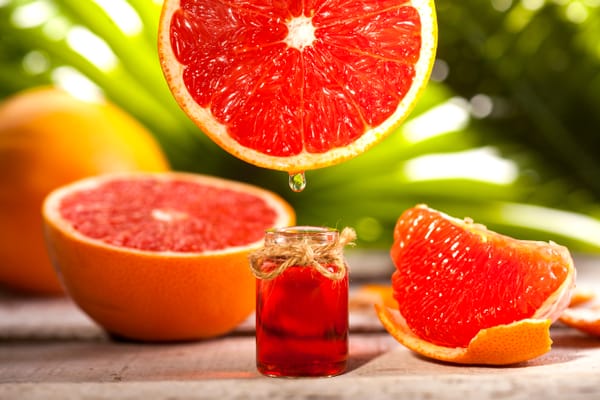Sip Serenity: Passionflower Tea for Stress Relief
Discover the calming benefits of passionflower tea. Learn how this herbal remedy can help relieve stress, improve sleep, and promote relaxation.

Feeling overwhelmed by the daily grind? I know the feeling all too well. That's why I always keep a stash of passionflower tea on hand. This calming herbal infusion has been my trusty sidekick for years, helping me unwind whenever stress threatens to take over.
Sipping on a cup of passionflower tea is like giving your mind and body a gentle hug. This soothing brew, made from the enchanting purple blooms of the passionflower vine, is packed with natural compounds that work together to calm your frazzled nerves and melt away feelings of anxiety.
Need more convincing? Dive into the studies that reveal passionflower tea's potential to rival prescription anxiety medications in terms of efficacy. The best part? You won't have to deal with that sluggish feeling afterwards. It's like a natural superpower!
Table of Contents:
- What Is Passionflower Tea?
- Health Benefits of Passionflower Tea
- How to Prepare Passionflower Tea
- Precautions and Side Effects
- Comparing Passionflower Tea to Other Herbal Teas
- Conclusion
What Is Passionflower Tea?
If you're looking for a soothing, calming herbal tea, look no further than passionflower tea. This unique brew is made from the dried leaves, flowers, and stems of the passionflower vine (Passiflora incarnata).
Overview of Passionflower
The passionflower is a climbing vine native to the southeastern United States. It's been used for centuries in traditional medicine for its calming properties. The vine produces beautiful white and lavender flowers with a unique fringed crown. Butterflies and bees love to visit these flowers as they gather pollen.
How Passionflower Tea Is Made
To make passionflower tea, the above-ground parts of the plant are harvested and dried. This dried passionflower material is then steeped in boiling water for 5-7 minutes to create a soothing, earthy-tasting tea. You can find organic passion flower tea in loose leaf form or in convenient tea bags. I personally love the ritual of steeping dried passionflower in a cozy mug of hot water. The mild, slightly grassy aroma is incredibly inviting and relaxing. If you prefer a stronger brew, just steep a bit longer or use more passionflower per cup.
Health Benefits of Passionflower Tea
What I love about passionflower tea is that it not only tastes wonderful, but it also offers some impressive health benefits. This herbal tea has been used for ages to promote calm and relaxation. Here are some of the top reasons to add passionflower tea to your self-care routine:
Reduces Anxiety and Stress
One of the most well-known benefits of passionflower tea is its ability to alleviate anxiety and stress. The compounds in passionflower have been shown to increase levels of gamma-aminobutyric acid (GABA) in the brain, which helps promote relaxation. Studies suggest that regularly drinking passionflower tea may help reduce symptoms of generalized anxiety disorder. Whenever I'm feeling overwhelmed or stressed out, I brew a cup of this tea and feel my worries start to melt away.
Improves Sleep Quality
If you struggle with occasional sleeplessness, passionflower tea may be able to help. While research is limited, one study found that passionflower extract helped improve sleep quality in rats. The calming properties of this tea make it a great choice for unwinding before bed. I find that sipping a cup of passionflower tea in the evening helps quiet my mind and allows me to drift off to sleep more easily.
Potential Pain Relief
Passionflower contains anti-inflammatory compounds that may offer some relief from aches and pains. While more research is needed, drinking passionflower tea regularly could potentially help ease discomfort from headaches, menstrual cramps, or other inflammatory conditions. I like to pair passionflower tea with other natural pain-relieving remedies like gentle stretching or applying a heating pad for an extra soothing effect.
How to Prepare Passionflower Tea
Ready to brew a cup of calming passionflower tea? Here's how to do it:
Steeping Instructions
If using loose leaf passionflower, place about 1 tablespoon of the dried herb into a tea strainer or reusable tea bag. If using pre-packaged tea bags, simply place one bag in your favorite mug. Pour 1 cup of boiling water over the passionflower. Allow to steep for 5-10 minutes, depending on your strength preference. The longer you steep, the stronger the tea will be. Remove the tea bag or strainer and enjoy your tea hot or iced. I find that passionflower tea has a mild, slightly earthy flavor that is pleasant on its own, but you can add a touch of honey or lemon if desired.
Recommended Dosage
While there is no official recommended dosage for passionflower tea, most people find that 1-2 cups per day provides the desired calming effects. I usually have a cup in the morning to ease into my day and another in the evening to help me unwind. It's always a good idea to start with a lower amount and gradually increase as needed. Passionflower is generally considered safe, but it's best to check with your healthcare provider before adding any new herbal remedy to your routine.
Adding Honey or Sweeteners
Passionflower tea has a delicate, mildly grassy flavor on its own. However, if you find it a bit too earthy for your taste, try stirring in a spoonful of raw honey or a squeeze of fresh lemon juice. I personally love adding a drizzle of local wildflower honey to my evening cup of passionflower tea. The subtle sweetness perfectly complements the tea's natural flavor. Feel free to experiment with different natural sweeteners to find your ideal cup of tea.
Precautions and Side Effects
While passionflower tea is generally considered safe for most people, there are a few precautions to keep in mind:
Interactions with Medications
Passionflower may interact with certain medications, especially those that affect the central nervous system. This includes sedatives, anti-anxiety drugs, and anticonvulsants. If you are taking any prescription medications, it's crucial to talk to your doctor before drinking passionflower tea regularly. They can advise you on potential interactions and help you determine if this herbal tea is right for you.
Pregnancy and Breastfeeding Considerations
Due to the lack of research on the safety of passionflower during pregnancy and breastfeeding, it's generally recommended to avoid drinking this tea if you are pregnant or nursing. While some small studies suggest it may be safe in moderation, it's always best to err on the side of caution. If you're expecting or breastfeeding and interested in using passionflower for its calming properties, please consult with your healthcare provider first. They can help you weigh the potential risks and benefits based on your individual situation.
Comparing Passionflower Tea to Other Herbal Teas
Passionflower isn't the only herbal tea known for its calming effects. Here's how it compares to a few other popular stress-relieving teas:
Chamomile Tea
Chamomile is another beloved herbal tea that promotes relaxation. It contains an antioxidant called apigenin that may help reduce anxiety by binding to certain brain receptors. I find that chamomile tea has a slightly sweeter, more floral flavor compared to passionflower. Both teas are wonderful for sipping before bed, but some people may find one more effective than the other for easing anxiety.
Valerian Root Tea
Valerian root is commonly used as a natural sleep aid due to its sedative properties. Like passionflower, valerian may help increase GABA levels in the brain to promote relaxation. However, valerian tea has a distinctly earthy, slightly bitter taste that takes some getting used to. I personally prefer the milder flavor of passionflower tea, but valerian can be a good choice if you need stronger sleep support.
St. John's Wort Tea
St. John's Wort is an herb that is often used to help alleviate symptoms of mild depression. It's sometimes taken in tea form, but more commonly as a capsule or tincture. While passionflower and chamomile are more targeted towards easing anxiety and promoting sleep, St. John's Wort is known for its mood-boosting effects. However, it can interact with many medications, so it's important to consult with a doctor before using it.
Key Takeaway:
Passionflower tea is your go-to for calming vibes and better sleep. With its ability to ease anxiety, improve sleep quality, and possibly relieve pain, it's a must-try in your self-care routine. Just steep the dried plant parts, sip up to twice daily, and maybe sweeten with honey or lemon. But remember to chat with your doctor if you're on meds or pregnant.
Conclusion
So there you have it - the secret to sipping your way to serenity with passionflower tea. This gentle herbal remedy has been a game-changer for me, and I hope it can bring some much-needed calm to your life too.
Passionflower tea is like a secret weapon for self-care. Brewing a cup is a small action that can yield big results, helping you feel calmer, more centered, and ready to take on whatever comes your way.
The next time stress starts to creep up on you, take a deep breath, steep some passionflower tea, and let its soothing properties work their magic. Your mind and body will thank you.




